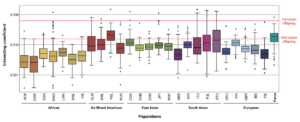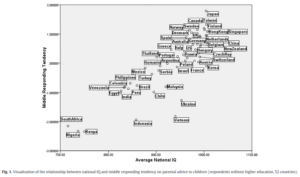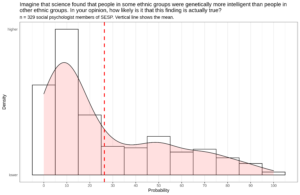In a Gelman-like approach to turning email replies into posts.
Someone sent me this email:
Thanks for answering this and the other email, and the links as well.I am not very familiar with the matter, my interests are usually in population genetics and physical anthropology, but immediately thought it was really curious to see people using Bird’s preprint as a refutation of hereditarian variation in human intelligence.My criticism of his “lumping” is due to the existence of a considerable degree of inter-ethnic variance inside racial groups.Piffer, for example, found different polygenic scores for different European populations.In my view it would also imply an even larger degree of variability inside Africans, considering their larger degree of genetic diversity compared to Eurasians.
People often get confused about the African variability. Africans are highly variable because they don’t have a lot of founder effects since they stayed in our species’ homeland. Most of the variation lost in non-Africans is nonfunctional rare variants. How do we know? If it was functional in a significant way, Africans would have higher standard deviations on measured human traits, intelligence, height etc., but we don’t see that, not in African Americans either. Note that a lot of this variation is also inside each smaller population in African, like those in the 1000 genomes database. In any case, the fact that a given large group has more variation does not imply it has more overall genetic variation between populations for any given trait, such as intelligence or height. So, there is no particular reason to expect there to be large within African variation in say, intelligence. We do have some decent amount of cognitive data for African nations, and they don’t seem to be particularly variable considering the often poor data quality. Naturally, many hope that someone will find an elite African ethnic group. The Igbos are probably the best current guess but I am not familiar with any Nigerian-based high quality cognitive data. If someone could liberate the data from this dataset of 11k Nigerians given the Raven, then maybe we could know. I have been trying to get it for years, I think there’s a decent chance it is fabricated given my complete lack of success. The best data I know of about these intra-African variations is John Fuerst’s 2015 ingenious analysis of last names and ability levels in north America (post 1, and post 2). So, maybe! Generally, we expect between population or subgroup variety in intelligence and other expensive traits, only when natural variation has favored this, i.e. in the presence of divergent selection. Hence, we may expect to see a lot of between population variation in various breeds of dogs, cats, and probably human groups in India.

- https://genomebiology.
biomedcentral.com/articles/10. 1186/s13059-019-1679-2 - https://genomebiology.
biomedcentral.com/articles/10. 1186/s13059-019-1740-1 - https://www.nature.com/
articles/nature13997 this sounds very promising - https://science.sciencemag.
org/content/367/6484/eaay5012. abstract also good
Finally, it should be said that given very low population genetic variation, there will be effects on traits, mainly related to inbreeding depression that causes diseases due to the increased likelihood of inheriting double recessive deleterious mutations. This is what we see in inbred populations like Ashkenazi Jews, Finns, French Canadians, and various others. However, even in these groups, there is no known reduction in observed trait variation in polygenic traits such as intelligence. If anything, Ashkenazi Jews seem psychologically more variable than many other groups, Han Chinese, less variable despite massive population size and no lack of genetic diversity (but see here).


